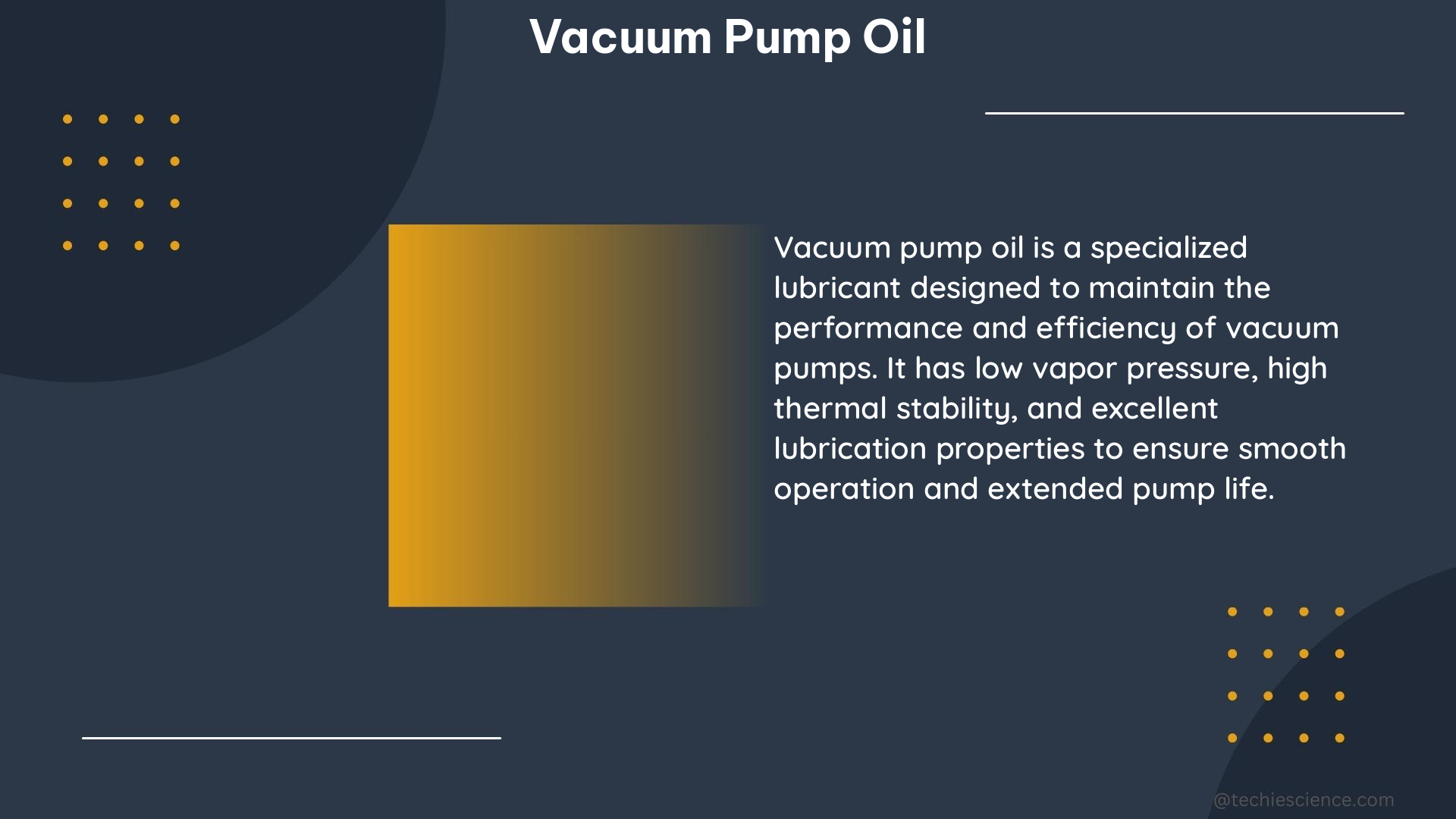Vacuum pump oil is a critical component in the operation of vacuum pumps, performing four key functions: sealing, capturing contaminants, lubricating, and cooling the pump. The quality and condition of the oil directly impact the performance of the pump, with moisture and contamination levels being particularly influential.
Understanding Vapor Pressure and Its Impact
The vapor pressure of vacuum pump oil is a crucial factor, as it determines the deepest possible vacuum achievable by that oil. Under perfect conditions, a sealing oil with a vapor pressure of 100 microns would allow the pump to pull a vacuum of 100 microns. However, when moisture and contaminants are introduced, the vapor pressure begins to rise, causing the evacuation process to stall at a higher micron level.
Appion’s TEZOM oil, for instance, has an ultra-low vapor pressure of less than 1 micron, ensuring better sealing for extended periods. This low vapor pressure allows the pump to maintain a deeper vacuum for longer, improving efficiency and reducing the need for frequent oil changes.
Composition and Properties of Vacuum Pump Oil

In terms of composition, vacuum pump oil typically consists of distillates (petroleum), hydrotreated heavy paraffinic, with a CAS number of 64742-54-7. This substance has a logPow of 3.9 to 6, indicating its potential for bioaccumulation. Its aquatic half-life is not available, and it is not classified under the GHS label elements.
The specific properties of vacuum pump oil can vary depending on the manufacturer and the intended application. Some key properties to consider include:
| Property | Typical Range |
|---|---|
| Viscosity (cSt at 40°C) | 32 – 100 |
| Density (g/cm³) | 0.85 – 0.92 |
| Flash Point (°C) | 200 – 250 |
| Pour Point (°C) | -30 – -15 |
| Oxidation Stability (hours) | 2,000 – 5,000 |
These properties directly impact the oil’s performance in terms of sealing, lubrication, and cooling, as well as its overall lifespan within the vacuum pump.
Maintaining Vacuum Pump Oil Cleanliness
When it comes to vacuum pump maintenance, flushing the pump with clean oil after each evacuation is essential. Contaminated oil left in the pump can harm the internal components, reducing the pump’s lifespan and increasing maintenance requirements.
Appion’s TEZOM oil, with its lower starting vapor pressure and crystal-clear appearance, is ideal for this purpose. The oil’s clarity aids in visually monitoring the condition of the oil, making it easier to identify the presence of moisture and contaminants in the system.
Regular oil changes and proper maintenance procedures are crucial to ensuring the longevity and optimal performance of your vacuum pump. Depending on the pump’s usage and the level of contamination, the oil should be changed every 500 to 2,000 hours of operation, or as recommended by the manufacturer.
Selecting the Right Vacuum Pump Oil
When choosing a vacuum pump oil, it’s important to consider the specific requirements of your vacuum pump, such as the desired vacuum level, operating temperature range, and compatibility with the pump’s materials. Some key factors to consider when selecting the right vacuum pump oil include:
- Vapor Pressure: As discussed earlier, the oil’s vapor pressure is a critical factor in determining the deepest possible vacuum achievable.
- Viscosity: The oil’s viscosity should be appropriate for the pump’s design and operating conditions, ensuring proper lubrication and sealing.
- Thermal Stability: The oil should maintain its properties and performance under the pump’s operating temperatures, which can range from -40°C to 200°C or more.
- Compatibility: The oil must be compatible with the pump’s materials, such as seals, gaskets, and internal components, to prevent damage or premature wear.
- Contaminant Resistance: The oil should be able to effectively capture and hold contaminants, preventing them from circulating through the pump and causing damage.
By carefully considering these factors and selecting the right vacuum pump oil for your specific application, you can ensure optimal performance, extended pump lifespan, and reduced maintenance requirements.
Conclusion
Vacuum pump oil plays a vital role in the performance and maintenance of vacuum pumps. Its vapor pressure, composition, and cleanliness are all critical factors that influence its effectiveness and the overall operation of the pump. By understanding the technical details and best practices for vacuum pump oil selection and maintenance, you can ensure your vacuum pump operates at peak efficiency and reliability.
References:
– Agilent Technologies Australia Pty Ltd. (2021). Vacuum Pump Oil – GP Type Mechanical Pump Fluid. Retrieved from https://www.agilent.com/cs/library/msds/Vacuum%20Pump%20Oil%20-%20GP%20Type%20Mechanical%20Pump%20Fluid_NACanada.pdf
– Appion. (2023). The True Purpose of Vacuum Pump Oil. Retrieved from https://appiontools.com/blog/the-true-purpose-of-vacuum-pump-oil/
– HVAC-Talk. (2023). Vacuum pump oil info needed!. Retrieved from https://hvac-talk.com/vbb/threads/1098171-Vacuum-pump-oil-info-needed!

The lambdageeks.com Core SME Team is a group of experienced subject matter experts from diverse scientific and technical fields including Physics, Chemistry, Technology,Electronics & Electrical Engineering, Automotive, Mechanical Engineering. Our team collaborates to create high-quality, well-researched articles on a wide range of science and technology topics for the lambdageeks.com website.
All Our Senior SME are having more than 7 Years of experience in the respective fields . They are either Working Industry Professionals or assocaited With different Universities. Refer Our Authors Page to get to know About our Core SMEs.